HANDLING
How to handle and tame your gecko.
Cresties are one of the better reptiles when it comes to handling - especially after a time when you have suitably tamed your pet you will find they are relatively placid after a few minutes - and many Cresties seem to actively enjoy being petted!
Cresties particularly like climbing all over people. Especially it seems the neck, shoulders and back! And they are world experts at dashing up your arm and launching off your shoulder! They are by far best known for their jumping prowess!
Cresties will jump and they jump surprisingly far and surprisingly well and the first time this will surprise you. But they are a small animal and will very quickly run out of steam and settle down - the trick is to learn that for the first few minutes they will be in a jumping mood - and you learn how to "walk" the gecko from hand to hand or let them simply jump from hand to hand as you alternate your hands each time they jump and free up the other hand.
They will quickly run out of energy and settle down. They most definitely benefit from frequent handling - not too often as that will simply stress them out, but you should incorporate some handling say every feeding time - pop them out for a few minutes then back in and give them their feed bowl.
The most important consideration naturally is to never grab the tail or the base of the tail - although Cresties are not prone to drop their tails at the slightest opportunity like some other reptiles - they do have a specialised set of muscles designed to shear off the tail - it takes a considerable amount of force to make a Crestie drop it's tail but it can and does happen. Although they look just as cute without a tail - letting them keep it is naturally preferable.
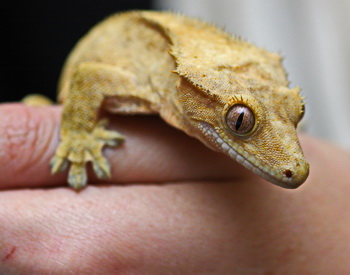
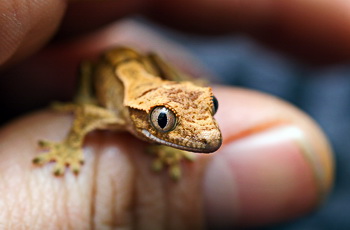
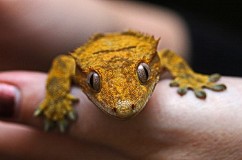
No matter how good you think you are at handling them they will eventually jump out of your hand and onto the floor. Although Cresties are more than capable of surviving a fall to the ground from the height of human adult stood up - it's preferable to practice damage limitation and try and handle them when sitting down - so that when they do eventually pull off this acrobat act they have a far smaller distance to cover before they hit the ground. - And landing on soft carpet is obviously advantageous to a hard floor also.
Never forcefully pull them off clothing, their perch or such items as you could inadvertently break the claws or even fingers in the process! They will let go of their grip eventually. Cresties especially if they have their feet on a smooth flat surface physically need to curl their toes up from the front to deactivate the bond their pads have on the surface - let them do this without forcing them.
When returning to the Vivarium Simply hold them pointing something - they'll either walk off your hand or jump off it into the vivarium!
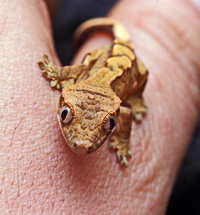
Handling Youngsters
I handle my hatchlings from 1 week of age - but it is important to understand what handling refers to at this age. It's important for the young gecko to realise I am not a threat as early as possible - if only to stop them stressing out and to ensure nice tame adults later on.
My handling at this stage is simply putting my hand in the container they are in with my fingers flat on the floor palm facing upwards. For cleaning I tend to actively encourage them to run or jump onto my hand for me to place them in another container whilst I clean. They will do this quite readily, if only I suspect; that in their heads they are planning to use your hand as a launch platform to escape!
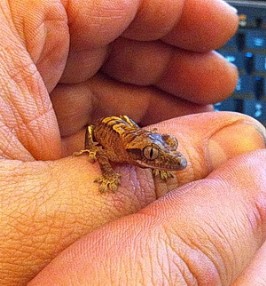
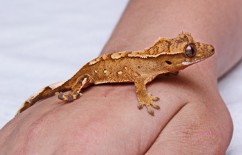
At this age some youngsters are full of fighting beans and will jump and run a lot faster than you think they will so you need to keep a watchful eye as they are fast! And being so small would easily be lost in the furniture never to be found again!
Some youngsters can be quite mouthy - two things happen - they either try and nip you or they open their mouths really wide as a warning. Once they realise it's you however they will soon chill out and calm down! It's important you don't over react and flinch away when they do this - there is no way on earth they are actually able to hurt you! I've been quite forcibly bitten by an adult Crestie and it only ever resulted in a pinching sensation and never cut my skin.
Us humans give off a lot of heat and the little gecko will immediately notice this and should quickly start to chill out so long as you keep your hand still. The very young especially just want to feel safe and secure so cup your hand into a cave and let them hide.
At about 4 -6 months of age they are large and chunky enough to easily handle more physical petting methods and by this stage will be quite tame from all the prior handling sessions.
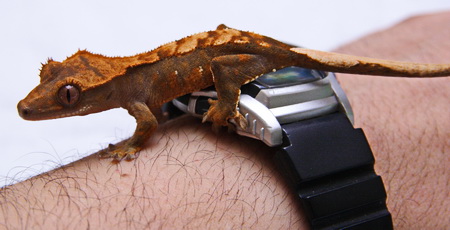
Hygiene.
Your hands must be cleaned before AND after handle your gecko. For this purpose I always use Purell in my house prior to and after handling to ensure I do not get anything from them - and crucially that they do not get anything from me either!
Will Crestie's bite me?
The will never bite unless they rarely mistake your finger for food. Even then the gecko has a fairly insignificant bite where humans are concerned.
They do have teeth but they are not significant enough to readily pierce human skin. The only sensation felt would be similar to another human giving you a very light pinch. However when educating children as to handling your Leo's you must explain to them about possible biting - as the instinctive human reaction to flinch could seriously injure the Gecko! They have weak - in comparison to us - jaws and bones and an ill thought flinch can easily snap these bones!
On the rare occasion where improper handling has hurt your gecko - they will respond with a survival bite. This type of bite is one with all the strength that they can muster - they are, in their own minds; now fighting for their life. This kind of bite will feel like quite a forceful pinch and if the gecko has some nicely developed teeth will feel like a little pin prick. It can - just like a pin prick - draw a little blood - this will usually only occur on very young human hands where the skin is more fragile than normal.
The gecko in this instance may not want to let go - calmly put it back in the Vivarium and let its feet touch something- then it will usually immediately let go and quickly make for the nearest hide.
You can avoid this from ever happening by always handling your gecko gently - never ever squeeze your gecko or pinch it!
You don't hold an animal like this in the way you would a cat or dog or even a small rodent. Think of yourself as just a temporary surface for them to climb and walk over.
If you have to hold them still for whatever reason it is best to form your hand into a sort of cage around them rather than putting any kind of pressure on them at all..